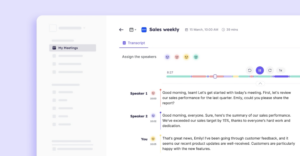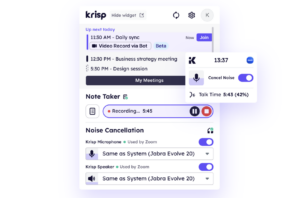A skip level meeting has been a great asset used by organizations all over the world. It offers unique opportunities to foster open communication, gain insights, and strengthen the overall organizational culture.
However, like any significant interaction, a skip level meeting requires careful preparation and execution to ensure they yield the desired outcomes.
This article takes you through all you need to know about skip-level meetings by thoroughly highlighting:
- Why skip-level meetings are beneficial to the company and employees,
- How to prepare for skip level meeting,
- Tips to effectively execute a skip-level meeting.
What Is a Skip Level Meeting?
This type of meeting involves a manager or a leader engaging directly with employees who are typically one or more levels below them in the organizational chart. The skip level meeting purpose is to establish a unique and strategic form of communication within the organization’s hierarchical structure.
Moreover, compared to typical one-on-one meetings, skip level meetings bypass the direct reporting chain, hence the term ‘skip-level’ and ‘skip manager.’ This allows higher-level managers to connect directly with employees further down the organizational ladder.
A Gallup report finds that disengaged employees are 37% more likely to be absent and 18% less productive, generating 15% lower profits. Hence, skip level meetings aim to foster open communication and employee engagement. The latter helps to build a deeper understanding of the company’s or organization’s dynamics from different perspectives.
For instance, a content writer at a company often reports to their direct supervisor, the content manager. However, in a skip level meeting, the content writer gets into a meeting with the marketing manager without the content manager in attendance.
But how exactly are such meetings beneficial? Do they add any value? Let’s find out in the next paragraphs of this article!
The Importance of Skip Level Meetings
A skip level meeting plays a crucial role in modern organizational structures.
From the managers’ perspective, skip level meetings offer a unique opportunity to gain valuable insights into the day-to-day operations and challenges faced by employees.
Managers can better understand their concerns, perspectives, and suggestions by directly engaging with lower-level team members, leading to more informed decision-making and improved leadership effectiveness.
Skip Level Meeting Benefits for a Skip Manager
- Enhancing Communications
The skip level meeting purpose is to provide managers with a direct line of communication with employees, bypassing traditional hierarchies. This fosters a sense of inclusivity and demonstrates to employees that their voices are heard and valued.
- Building Trust and Morale
By showing genuine interest in the well-being and development of employees, managers can build trust and boost morale. This can lead to increased employee engagement and productivity.
- Gaining Insights and Feedback
Skip level meetings offer a unique vantage point for managers to gain insights and feedback on various aspects of the organization, including processes, policies, and team dynamics.
Skip Level Meeting Benefits for Employees
Employees, obviously, have somewhat possibilities and hopes tied to skip level meetings, but they’re not entirely different. Let’s see which those are:
- Create a Feeling of Being Valued and Recognized
A skip level meeting allows employees to interact with higher-level managers, making them feel valued and recognized for their contributions.
- Foster Professional Development
These meetings can also serve as a platform for employees to discuss their career goals and aspirations, paving the way for professional development opportunities.
- Improve Organizational Culture
By fostering open communication and transparency, skip level meetings contribute to a positive organizational culture in which employees feel empowered and motivated to excel.
- Highlight Employee Expertise
By sharing their experiences and insights directly, employees can showcase their expertise to senior leaders. This recognition of their knowledge can increase trust, potential cross-functional opportunities, and a deeper appreciation for their contributions.
- Promote Efficient Issue Resolution
Skip-level meetings allow senior leaders to address issues promptly and effectively. By directly engaging with employees, leaders can identify challenges early and take corrective action, minimizing the potential negative impact on operations.
How to Prepare for Skip Level Meeting
This kind of meeting allows managers to gather feedback, identify potential roadblocks, and foster a more engaged and productive workforce. However, no matter the format – hybrid skip level meetings, in-person or online, to make the most of them, proper preparation is crucial for both employees and managers.
How Should an Employee Prepare for a Skip-Level Meeting?
There’s a slight difference between how an employee must get ready for a skip-level meeting and how a skip manager should. So let’s clarify how an employee should do it.
Understand the purpose
Familiarize yourself with the objectives of the skip level meeting. Is it to discuss career development, provide feedback, or address specific concerns? Having a clear understanding of the purpose will help you prepare accordingly.
Gather relevant information
Collect any necessary and relevant data or documents so you won’t be left unsure the whole time about what to discuss in a skip level meeting. This could include project updates, performance metrics, or examples of your work.
Prepare questions
Develop a list of thoughtful questions to ask in skip level meetings that you would like to ask the senior manager. This could include inquiries about the company’s strategic direction, industry trends, or their personal experiences and leadership style.
Identify challenges and opportunities
Reflect on any challenges you or your team may be facing at present. Consider potential solutions or opportunities for improvement that you can discuss during the skip level meeting.
Review your goals and accomplishments
Be prepared to discuss your career aspirations, goals, and recent accomplishments. This will help the senior manager provide tailored guidance and support.
Practice active listening
Effective communication involves not only speaking but also actively listening. Prepare to engage in an open and honest dialogue, and be ready to receive feedback or constructive criticism.
How Should a Skip Manager Prepare for a Skip Level Meeting?
Now that you know how employees prepare for skip-level meetings, it’s time to outline the way senior-level managers should do the same.
Set clear objectives
Establish specific goals or areas of focus for the meeting. This could include gathering feedback on a particular initiative, assessing team dynamics, or identifying potential areas for improvement.
Review employee performance
Familiarize yourself with the employee’s background, roles, and responsibilities. Review any retrospective performance data or feedback from their direct manager.
Develop open-ended questions
Prepare a set of open-ended questions to ask in skip level meeting that encourage meaningful dialogue; ones that allow the employee to share their perspectives and experiences freely.
Create a welcoming environment
Some employees find skip-level meetings intimidating. Aim to create a comfortable and inclusive atmosphere that encourages open communication during the meeting.
Be open to feedback
Approach the meeting with an open mind and a willingness to receive positive and constructive feedback. This will help foster trust and encourage honest dialogue.
Plan for follow-up
Identify potential action items or areas that may require further discussion or follow-up. Determine the agenda of the meeting and how you will communicate and address any issues or suggestions raised during the meeting.
Highlight actionable steps
Indicate how you plan to address the feedback and concerns raised during the meeting to build trust and confidence with the employees.
Furthermore, you can organize catch-up meetings to follow up on the commitments made to show the employees that their feedback is taken seriously and that the organization is dedicated to improvement.
By preparing thoroughly, employees and managers can make the most of skip level meetings, fostering open communication, identifying opportunities for growth and improvement, and ultimately strengthening the organization’s culture and performance.
Questions to Ask in Skip Level Meeting
To make the most of your meetings, it’s essential to come prepared with thoughtful questions that can facilitate meaningful discussions and uncover valuable insights.
Questions for Employees to Ask in a Skip Level Meeting
- What are the company’s long-term strategic goals, and how does my role contribute to achieving them?
- Can you share your perspective on the current challenges or opportunities our team/department is facing?
- What advice would you give to someone in my position who aspires to grow within the organization?
- How would you describe the company’s culture, and what values or principles guide decision-making?
- From your experience, what are the key traits or skills necessary for success in our industry/field?
- Could you share an example of a significant challenge you faced in your career and how you overcame it?
- What learning and development opportunities are available to employees interested in expanding their knowledge or skillset?
Questions for Managers to Ask in a Skip Level Meeting
- Can you describe your day-to-day responsibilities and the most rewarding/challenging aspects of your role?
- How would you evaluate the communication and collaboration within your team or department?
- What improvements or changes would you suggest to enhance our processes, policies, or work environment?
- Are there any skills or areas of expertise you believe our team could benefit from developing further?
- Could you share an example of a recent project or initiative that you’re particularly proud of and why?
- What motivates you in your work, and what could the organization do to support employee engagement better?
- If you could implement one change or initiative to improve our company’s overall performance, what would it be?
By asking thoughtful and insightful questions, both employees and managers can gain valuable perspectives, identify potential areas for improvement, and foster a more engaged and productive workforce.
Boosting Productivity at Skip-Level Meetings with Krisp
A skip level meeting, a powerful tool for communication and collaboration, has taken a new leap with the integration of Krisp, an AI-powered meeting productivity tool.
Krisp proves to be an indispensable asset for both senior management and employees, elevating the quality and effectiveness of skip-level interactions.
Unveiling Krisp’s AI Meeting Assistant
Krisp’s AI meeting assistant transforms the way skip level meetings are conducted, offering a range of features that streamline communication, enhance information retention, and improve overall meeting productivity.
Meeting Transcription for Comprehensive Documentation
One of Krisp’s standout features is its state-of-the-art meeting transcription tool. During a skip level meeting, every word spoken is accurately transcribed, ensuring that no vital information, insights, or decisions are lost or forgotten.
This feature proves invaluable for both employees and senior management, as it allows them to easily review and refer back to the meeting’s content.
Transcriptions help in maintaining a record of discussions and can be particularly useful for future reference, follow-ups, or audits.
Efficient Meeting Summaries
Krisp takes meeting notes to a new level with its AI note-taker. Instead of manually sifting through a lengthy transcription, Krisp’s AI distills the meeting’s key discussions, decisions, and action items into a concise and effective meeting summary.

This feature eliminates the need for time-consuming note-taking, allowing participants to focus on engaging in the conversation rather than taking copious notes.
The generated summaries serve as a ready reference point, ensuring that the essential meeting takeaways are captured and easily accessible.
Active Noise Cancellation for Enhanced Focus
Distractions and background noise can detract from the quality of a skip level meeting.

Krisp’s active noise cancellation technology addresses this challenge by effectively eliminating extraneous sounds, ensuring that the meeting’s participants can concentrate on the conversation at hand.
This creates an environment conducive to meaningful exchanges, promoting engagement and participation from both sides.
Final Words
Skip level meetings bridge hierarchical gaps, promoting organizational transparency and mutual understanding. Proper preparation from both employees and managers is key to unlocking the full potential of these interactions.
Combining thoughtful planning with AI-driven productivity tools like Krisp can elevate the effectiveness of skip level meetings. Implementing them backed by innovative technology fosters a communicative culture, stimulates growth opportunities, and aligns efforts across teams.
By incorporating Krisp into meetings, organizations can significantly enhance the quality and outcomes of these interactions.
Krisp revolutionizes skip level meetings, turning them into more efficient, productive, and impactful interactions. Try Krisp for free today!


